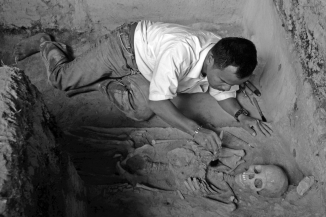Exam 1: Anthropology in a Global Age
Exam 1: Anthropology in a Global Age66 Questions
Exam 2: Culture70 Questions
Exam 3: Fieldwork and Ethnography63 Questions
Exam 4: Language62 Questions
Exam 5: Human Origins69 Questions
Exam 6: Race and Racism70 Questions
Exam 7: Ethnicity and Nationalism63 Questions
Exam 8: Gender67 Questions
Exam 9: Sexuality62 Questions
Exam 10: Kinship, Family, and Marriage72 Questions
Exam 11: Class and Inequality68 Questions
Exam 12: The Global Economy68 Questions
Exam 13: Migration62 Questions
Exam 14: Politics and Power70 Questions
Exam 15: Religion70 Questions
Exam 16: Health, Illness, and the Body69 Questions
Exam 17: Art and Media63 Questions
Select questions type
The so-called "N-word" would be most likely studied for its origins, uses, and meaning by a(n):
(Multiple Choice)
4.7/5  (32)
(32)
One aspect of globalization is uneven development. Explain what this means and how it affects the world. Provide an example.
(Essay)
5.0/5  (43)
(43)
The author states that pollution, population growth, climate change, and overfishing are serious issues, and nature may not be able to adapt to:
(Multiple Choice)
4.9/5  (39)
(39)
Which subfield of anthropology traces the history of human evolution in fossils? 
(Multiple Choice)
4.9/5  (31)
(31)
The British Petroleum Deepwater Horizon disaster in 2010 poured 210 million gallons of crude oil into the Gulf of Mexico over the course of two months. What is the British Petroleum oil spill characteristic of?
(Multiple Choice)
4.8/5  (44)
(44)
Explain the difference between a descriptive linguist and a sociolinguist. If you knew the last living speaker of a language and wanted to preserve that language, who would you call and why?
(Essay)
4.8/5  (42)
(42)
Showing 61 - 66 of 66
Filters
- Essay(0)
- Multiple Choice(0)
- Short Answer(0)
- True False(0)
- Matching(0)